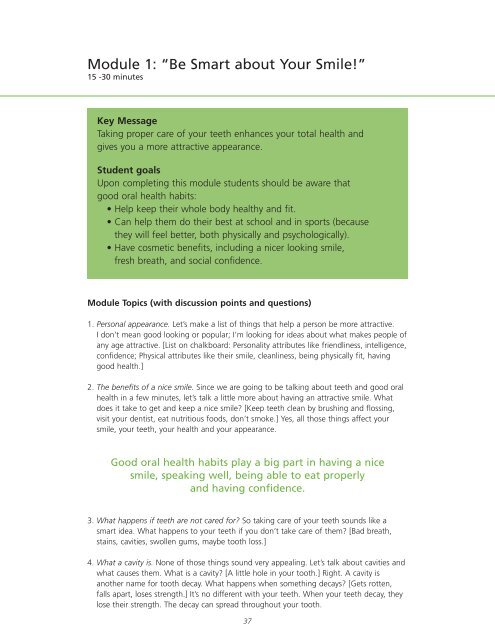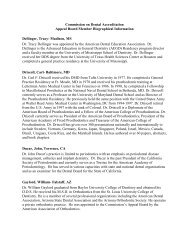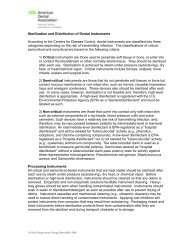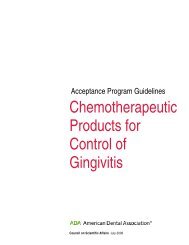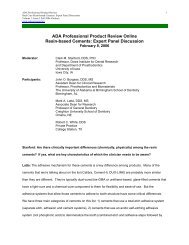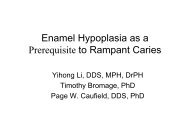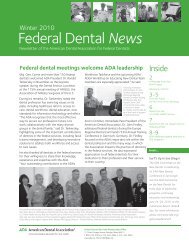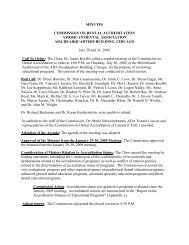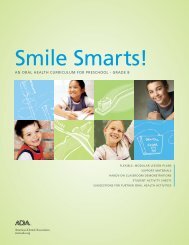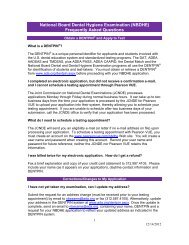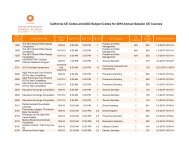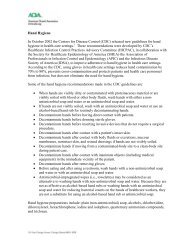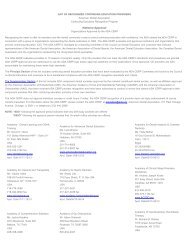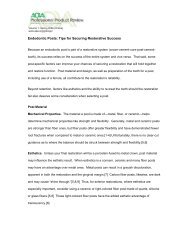Module 1: "Be Smart about Your Smile!" - American Dental Association
Module 1: "Be Smart about Your Smile!" - American Dental Association
Module 1: "Be Smart about Your Smile!" - American Dental Association
You also want an ePaper? Increase the reach of your titles
YUMPU automatically turns print PDFs into web optimized ePapers that Google loves.
<strong>Module</strong> 1: “<strong>Be</strong> <strong>Smart</strong> <strong>about</strong> <strong>Your</strong> <strong>Smile</strong>!”<br />
15 -30 minutes<br />
Key Message<br />
Taking proper care of your teeth enhances your total health and<br />
gives you a more attractive appearance.<br />
Student goals<br />
Upon completing this module students should be aware that<br />
good oral health habits:<br />
• Help keep their whole body healthy and fit.<br />
• Can help them do their best at school and in sports (because<br />
they will feel better, both physically and psychologically).<br />
• Have cosmetic benefits, including a nicer looking smile,<br />
fresh breath, and social confidence.<br />
<strong>Module</strong> Topics (with discussion points and questions)<br />
1. Personal appearance. Let’s make a list of things that help a person be more attractive.<br />
I don’t mean good looking or popular; I’m looking for ideas <strong>about</strong> what makes people of<br />
any age attractive. [List on chalkboard: Personality attributes like friendliness, intelligence,<br />
confidence; Physical attributes like their smile, cleanliness, being physically fit, having<br />
good health.]<br />
2. The benefits of a nice smile. Since we are going to be talking <strong>about</strong> teeth and good oral<br />
health in a few minutes, let’s talk a little more <strong>about</strong> having an attractive smile. What<br />
does it take to get and keep a nice smile? [Keep teeth clean by brushing and flossing,<br />
visit your dentist, eat nutritious foods, don’t smoke.] Yes, all those things affect your<br />
smile, your teeth, your health and your appearance.<br />
Good oral health habits play a big part in having a nice<br />
smile, speaking well, being able to eat properly<br />
and having confidence.<br />
3. What happens if teeth are not cared for? So taking care of your teeth sounds like a<br />
smart idea. What happens to your teeth if you don’t take care of them? [Bad breath,<br />
stains, cavities, swollen gums, maybe tooth loss.]<br />
4. What a cavity is. None of those things sound very appealing. Let’s talk <strong>about</strong> cavities and<br />
what causes them. What is a cavity? [A little hole in your tooth.] Right. A cavity is<br />
another name for tooth decay. What happens when something decays? [Gets rotten,<br />
falls apart, loses strength.] It’s no different with your teeth. When your teeth decay, they<br />
lose their strength. The decay can spread throughout your tooth.<br />
37
A cavity is a small hole in a tooth,<br />
also known as tooth decay.<br />
5. What plaque is. Does anyone remember what causes cavities? [You may get a variety of<br />
answers, but they may not include plaque.] Those are all interesting answers, but there<br />
is one thing that plays a big part in causing decay, or cavities, in your teeth. It is called<br />
“plaque.” Sound familiar? If you don’t brush your teeth before going to bed at night,<br />
how does your mouth feel when you wake up in the morning? [Tastes bad, smells bad,<br />
teeth feel sticky.] That is because plaque has been forming in your mouth all night.<br />
Plaque is a sticky, clear film that is forming on your teeth 24 hours a day.<br />
Plaque is a sticky, clear film that is constantly<br />
forming on your teeth.<br />
6. How plaque contributes to decay. When you eat or drink foods containing sugars and<br />
starches, the bacteria (germs) in plaque produce acids that attack tooth enamel. The<br />
stickiness of the plaque keeps the harmful acids against the teeth. After many such attacks,<br />
the tooth enamel — the hard outer layer of each tooth — breaks down and a cavity forms.<br />
Each acid attack can last as long as 20 minutes, making cavities bigger and bigger. So, do<br />
any of you think you have plaque on your teeth right now?<br />
7. Plaque and gum disease. If the plaque is not removed effectively with daily brushing and<br />
cleaning between teeth with floss, it eventually hardens into calculus or tartar. Tartar must<br />
be removed, because it makes your teeth more difficult to clean. If tartar is not removed,<br />
it can lead to gingivitis, an early form of gum disease in which your gums become irritated<br />
and can bleed easily. [Gingiva = gums; -itis = inflammation] That’s why it is important to<br />
brush your teeth twice a day, floss daily and have your teeth professionally cleaned at the<br />
dental office.<br />
The sugars in food and germs in plaque mix together<br />
to make acid. The acids in your mouth attack your teeth<br />
and can make cavities. Repeated acid attacks make<br />
cavities grow bigger.<br />
Twice-daily brushing and once-daily flossing help remove<br />
bits of food and plaque from the mouth and are essential<br />
in preventing both tooth decay and gum disease.<br />
7. Repairing cavities. What happens when someone gets a cavity in their tooth? Does it heal<br />
itself? [No. You have to go to the dentist to get it repaired.] That’s right. Only your dentist<br />
can repair a cavity, by removing the decay and putting a special filling material in the hole.<br />
38
Cavities cannot go away by themselves.<br />
They must be treated by a dentist.<br />
8. Three ways to keep teeth their best. Let’s talk <strong>about</strong> the three main ways we can keep<br />
those “pearly whites” in smiling condition: proper brushing and flossing, eating<br />
nutritious foods, and regular dental visits.<br />
9. Proper brushing. Let’s start with brushing, and list all the good things that happen when<br />
we brush our teeth. [Brushing cleans food and plaque off teeth, fights acid, makes your<br />
breath smell good, makes your mouth taste good.] Good answers. How often should you<br />
brush your teeth? [Twice a day.] There is an important ingredient in most toothpaste that<br />
helps your teeth. Does anyone know what it is? [Fluoride.] What does fluoride do?<br />
[Fluoride prevents cavities by strengthening and protecting the tooth enamel from acid.]<br />
Brush twice a day with a fluoride toothpaste.<br />
Fluoride toothpaste helps prevent cavities by<br />
protecting tooth enamel.<br />
Move the brush back and forth gently in short strokes. Brush the top, front, and back<br />
sides of each tooth. If you are wearing braces, you should ask your general dentist or<br />
orthodontist <strong>about</strong> the best way to brush and keep your teeth clean.<br />
You should also gently brush your tongue. Really! <strong>Your</strong> tongue has lots of germs on it<br />
that can cause your breath to smell bad. And by the way, toothbrushes don’t last forever.<br />
If your toothbrush looks like this (hold up Old and New Toothbrushes), with bent or<br />
broken bristles, it’s time to toss it and get a new one! You should use a toothbrush that<br />
is comfortable to hold and easily reaches all tooth surfaces.<br />
ACTIVITY #1: Here is a picture of one way to brush your teeth. It says...<br />
(Show How to Brush and read instructions. Ask for questions and comments.)<br />
Move the brush back and forth gently in short strokes.<br />
Brush the top, front and back sides of each tooth.<br />
Brush your tongue gently, too.<br />
Use a toothbrush that easily reaches all tooth surfaces<br />
and is comfortable to hold.<br />
10. Flossing. How many of you floss your teeth each day? Flossing cleans between your<br />
teeth, which is just as important as brushing them. There are lots of types of floss you<br />
can choose from — waxed, unwaxed, flavored, string or flat tape. Flossing is not as<br />
easy to do as brushing, so if you don’t remember how, ask your dentist, then practice.<br />
39
You should floss once a day. Why is flossing important? [Helps remove bits of food and<br />
plaque from between teeth, where your toothbrush can’t reach. Helps keep your gums<br />
healthy.] <strong>Your</strong> permanent teeth are much closer together than your baby teeth were,<br />
and flossing those choppers is essential for healthy teeth and gums — and fresh breath,<br />
too! But floss gently. It doesn’t take a lot of muscle to remove the plaque and debris<br />
from between your teeth — just determination.<br />
Floss your teeth gently, once a day.<br />
ACTIVITY #2: Show floss and explain the technique used in How to Floss.<br />
11. Good nutrition. How does what we eat and drink affect our teeth? [Get a few comments.]<br />
What we eat and drink, and how often, affect how much acid is made by the plaque<br />
in our mouths.<br />
What we eat and drink, and how often, affect how much<br />
acid is produced in our mouths.<br />
Who remembers the food groups? [List on board.] Eating a mix of foods from these<br />
groups for breakfast, lunch and dinner is the best way to keep your teeth and whole<br />
body in good shape. You know how important it is to eat right when you are in<br />
sports or dance. Well, your teeth are just as affected by what you put in your mouth.<br />
Did you know that Olympic athletes have their own dentist? That’s because athletes<br />
cannot reach peak performance if their mouths are sore or if their teeth ache. Eating<br />
a nutritious mix of foods also helps you stay at your proper weight, helps keep your<br />
skin clear and makes your hair shiny! (Visit www.mypyramid.gov for more<br />
information.) So let’s see how good you are at making up some healthy meals.<br />
ACTIVITY #3: Divide the class into teams of four students. See which can be<br />
the first group to make up a menu of three balanced meals and two healthy<br />
snacks. Discuss the choices, and how nutritious foods benefit your teeth as well<br />
as your total health.<br />
Eating a nutritious mix of foods from the food groups is the<br />
best way to keep your teeth and body healthy.<br />
Those are very creative meal ideas! But what <strong>about</strong> sweets? Do you have to give up ALL<br />
sweets to have a healthy body and teeth? [Get opinions.] Munching on snacks all day<br />
and drinking lots of soda pop is not good for your body. It can cause an unhealthy<br />
40
weight gain and cavities, too! Who remembers what happens in our mouths after we<br />
eat? Yes, plaque and sugar mix to form acid. Then the acid attacks our teeth. The more<br />
often we eat snacks, the more acid attacks we have. Don’t eat too many sweets or<br />
drink a lot of soda pop. But if you have sweets, eat or drink them with your meals,<br />
because your saliva helps wash the acid off your teeth. If you need a snack between<br />
meals, choose nutritious foods like fruit, low-fat cheese, low-fat yogurt, or raw<br />
vegetables. If you are thirsty, have a glass of water or low-fat milk.<br />
If you want sweets, eat or drink them with your meals.<br />
If you snack, eat nutritious foods.<br />
What <strong>about</strong> chewing gum? [Get opinions.] Chewing gum for <strong>about</strong> 20 minutes<br />
immediately after a meal or snack is okay as long as the gum is sugarless. In fact,<br />
sugar-free gum makes your mouth produce more saliva, which helps rinse the acid<br />
off your teeth to prevent tooth decay.<br />
Chewing sugarless gum increases saliva and<br />
helps wash out food and acid.<br />
12. <strong>Dental</strong> visits. So far we have talked <strong>about</strong> three important ways you can care for your<br />
teeth — brushing, flossing and eating nutritious foods. There is one more very important<br />
thing we should all do to keep our teeth healthy — visit our dentist regularly. What does<br />
your dentist do? Let’s list some of the things that can happen during a routine dental<br />
visit. [Examines your teeth, gums and the rest of your mouth to see if they are healthy;<br />
tells you how to take good care of your teeth; fixes cavities and repairs teeth; checks<br />
your mouth for sores and signs of cancer; sometimes takes X-rays to see the insides of<br />
teeth and jawbone; gives you a fluoride treatment.]<br />
What else? [You have your teeth professionally cleaned.] Why is that important? [Even<br />
when you brush well, some plaque stays on your teeth and, over time, hardens into tartar.<br />
Tartar can only be removed by a professional cleaning.] Who remembers what we said<br />
earlier <strong>about</strong> why tartar must be removed from teeth? [Tartar must be removed because it<br />
makes your teeth more difficult to clean. If tartar is not removed, it can lead to gingivitis,<br />
an early form of gum disease in which your gums become irritated and can bleed easily.]<br />
Ask your dentist when your next visit should be!<br />
Visit your dentist regularly.<br />
A routine dental visit includes an examination of your teeth<br />
and mouth, professional cleaning, and may include X-rays,<br />
repair of damaged teeth and a fluoride treatment.<br />
Summary: Good oral health care provides many benefits that go beyond cavity prevention.<br />
• It helps keep your whole body healthy and fit.<br />
• It can help you do your best at school and in sports, because you will feel better, both<br />
physically and mentally.<br />
• It has cosmetic benefits, including a nicer looking smile, fresh breath, and social<br />
confidence.<br />
41
W569<br />
© 2005 <strong>American</strong> <strong>Dental</strong> <strong>Association</strong><br />
All rights reserved. Printed in USA<br />
To reorder, call 1-800-947-4746 or<br />
visit www.adacatalog.org


